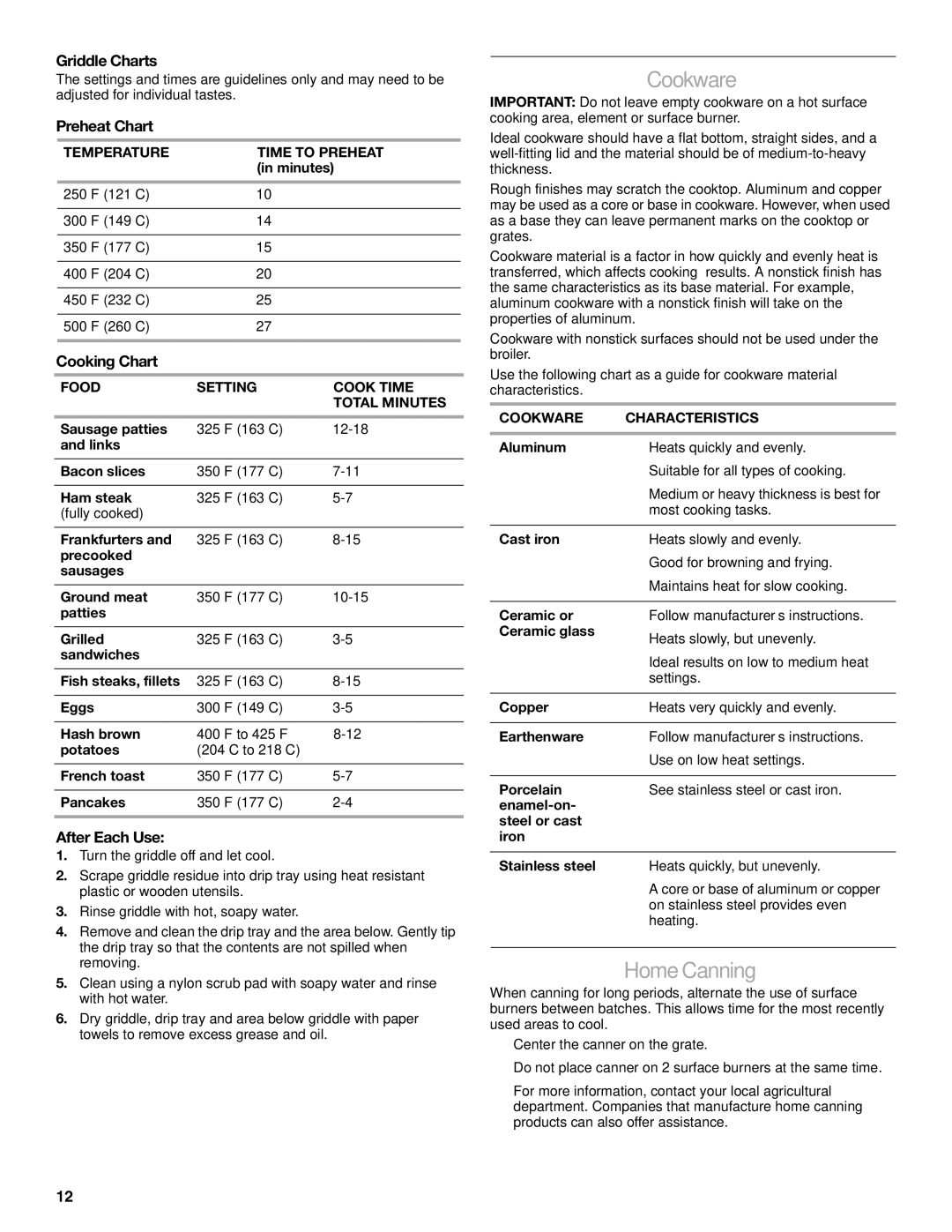Guided’utilisationetd’entretien
Models/Modèles KDRU707 KDRU763 KDRU767 KDRU783 W10285549A
Table of Contents
Table DES Matières
Range Safety
Your safety and the safety of others are very important
Important Safety Instructions
Anti-Tip Bracket
For self-cleaning ranges
For units with ventilating hood
Parts and Features
Range
Oven Interior
Control Panels
KDRU707 KDRU767
KDRU763
KDRU783
Reignition Feature
Simmer Burner Settings To Set
Cooktop USE
CooktopControls
Power Failure
Cooktop Surface
Sealed Surface Burners
15,000 Btu/h Professional Burner
To Clean
Even-Heat ChromeElectricGriddle
To Use
Cookware
HomeCanning
Electronic Oven Controls
Control Panel
Glass-Touch Menu DrivenDisplay
30 76.2 cm and 36 91.4 cm Range Control Panel
MainMenus
Display
Touch Screen
Menu Demonstration
Settings
Calibration Oven Temperature Control
Sound Tones
Temp FormatFahrenheitand Celsius
LearnMode
SabbathMode
To Set Delayed
To Regularly Set Timed
Timer
Languages
Clock
Start
Oven USE
AboutYourOven
AluminumFoil
Bakeware
SatinGlide Roll-Out Extension Rack
MeatThermometer
Bakeware
To Remove SatinGlide Roll-Out Extension Rack
Oven Vent
Bakingand Roasting
True-Broil Reflector Full and CenterBroiling
To Bake or Roast
Broiling Chart
DualFanTrueConvection Cooking
To Broil
Food Cook Time
ConvectionBake
To Convection Bake
Convection Roast
Convection Broil
To Convection Roast
To Convection Broil
Setting Foods
EasyConvect Conversion
Proofing Bread
To Proof
AutoSteamSettings
STEAM-ASSISTED Cooking
AutoSteam
Seafood
Breads
Vegetables
Desserts
Manual Steam
Keep Warm
To Cook with Manual Steam
Temperature Probe
Keep Warm Chart Setting Recommended Foods
Timed/Delay Cooking
To Set a Delay Cooking Time
To Set a Cooking Time
Cooking Charts
Bread Baking Chart
Yeast Breads
Quick Breads
CasserolesBakingChart
DessertsBaking Chart
Food Oven Browning
Food Oven
Auto SteamVegetableCookingChart
Auto Steam Seafood Cooking Chart
Manual Steam CookingChart
Food Oven Temperature Browning Cooking Time
AutoSteamMeats and Poultry RoastingChart
PER 1 LB Temperature
Pork Loin Center Rib Roast Lbs 1.4-1.8 kg
Pork Tenderloin 1 lb 454 g
Ham, fully cooked shank ½-10 lbs 4.3-4.5 kg
Lamb Leg of Lamb 6-7 lbs 2.7-3.1 kg
Self-Cleaning Cycle
Range Care
Water Filter Cartridge Replacement
GeneralCleaning
PORCELAIN-COATED Grates and Caps
Surface Burners
Oven Lights
Oven Door
Troubleshooting
Assistance or Service
TheU.S.A
Accessories
Canada
Kitchenaid Dual Fuel Range Warranty
Limited Warranty
Items Excluded from Warranty
This limited warranty does not cover
Page
Page
Sécurité DE LA Cuisinière
Votre sécurité et celle des autres est très importante
Labride antibasculement
Conservez CES Instructions
Pour les cuisinières avec programme d’autonettoyage
Pour les appareils avec hotte de ventilation
Pièces ET Caractéristiques
Cuisinière
Intérieur du four
Tableaux de commande
KDRU707
KDRU767
KDRU783
Commandesdela table decuisson
Réglage Utilisation Recommandée
Utilisation DE LA Table DE Cuisson
Caractéristique de rallumage
Surface delatabledecuisson
Brûleurs desurfacescellés
Réglages de brûleurs à mijotage
Panne de courant
Plaqueà frire chromée électriqueEven Heat
Nettoyage
Utilisation
Ustensilesdecuisson
Tableaux de cuisson avec plaque à frire
Tableau de préchauffage
Tableau de cuisson
Commandes Électroniques DU Four
Tableau de commande de la cuisinière de 48 121,9 cm
Préparation deconserves àlamaison
Tableaudecommande
Écran tactile en verre à menus
Afficheur
Écran tactile
Menusprincipaux
Démonstration de menu
Réglages
Partir du menu Cuiss. vap. auto., appuyer sur Volaille
Calibragecommandedela température Du four
Sons signaux sonores
Contrasted’affichage
Formatdetempérature Fahrenheit et Celsius
Filtre à eau/système de filtration deleau
Moded’apprentissage
ModeSabbat
Désactivation
Pour un réglage normal, non minuté
Pour un réglage normal, minuté
Modèles de 30 76,2 cm et 36 91,4 cm
Réglage de cuisson différée
Langues
Horloge
Startmiseen marche
Minuterie
Verrouillage de lacommande
Utilisation DU Four
Off arrêt
Àpropos du four
Ustensiles de cuisson
Positionnement desgrilles et desustensiles Decuisson
Grilles
Ustensiles DE Cuisson
Grille coulissantedéployante SatinGlide
Thermomètreàviande
Évent du four
Dépose de la grille coulissante déployante SatinGlide
Cuisson au fouretrôtissage
Cuisson au four ou rôtissage
Cuissonparconvectionvéritableàdouble Ventilateur
Cuisson au gril
Tableau DE Cuisson AU Gril
Aliment Durée DE Cuisson
Cuisson aufourparconvection
Cuisson au four par convection
Rôtissage parconvection
Cuisson au gril parconvection
Rôtissage par convection
Conversion EasyConvect
Levéedu pain
Cuisson au gril par convection
Pour faire lever la pâte
Cuisson Avec Injection DE Vapeur
Cuisson àla vapeur automatique
Réglagesdecuisson àlavapeurautomatique
Viandes
Volaille
Fruits de mer
Pains
Légumes
Cuisson àlavapeurmanuelle
Cuisson avec le réglage Cuisson à la vapeur automatique
Cuisson avec le réglage Cuisson à la vapeur manuelle
Garderauchaud
Sondethermométrique
Cuisson minutée/différée
Réglage dune durée de cuisson
Réglage dune durée de cuisson différée
Tableaux DE Cuisson
Tableaudecuisson du pain
Pains à la levure
Pains éclairs
Tableau decuisson desmets en sauce
Autres aliments
Aliment Température Brunissage Durée DE Cuisson DU Four
Tableau decuisson desdesserts
Tableau decuisson à la vapeurautomatique des légumes
Aliment Température
Aliment Température DU Brunissage Durée DE Cuisson Four
Tableaudecuisson àlavapeurautomatiquedes fruits de mer
Tableau decuisson àlavapeurmanuelle
Vapeur
Faux-filet de rôti de bœuf, désossé 4½ lb 1,8 à 2 kg
Rôti de bœuf, surlonge, désossé 5 lb 1,8 à 2,3 kg
Rôti de porc, longe centrale 4 lb 1,4 à 1,8 kg
Filet de porc 1 lb 454 g
Poulet rôti 4 à 5 lb 1,8 à 2,3 kg
Poulet rôti 6 à 6½ lb 2,7 à 2,9 kg
Dinde Dinde 10 à 12 lb 4,5 à 5,4 kg
Dinde 14 à 17 lb 6,4 à 7,7 kg
Entretien DE LA Cuisinière
Programme dautonettoyage
Préparation du four
Comment fonctionne le programme
Remplacement delacartouchedu filtre à eau
Nettoyagegénéral
Tableau DE Commande
Commandes DE LA Table DE Cuisson
Grilles ET Chapeaux Émaillés
Brûleurs DE Surface
Réinstallation
Lampes dufour
Portedu four
Dépose
Dépannage
Le programme d’autonettoyage ne fonctionne pas
Le four a-t-il été préchauffé?
Assistance OU Service
Si vous avez besoin de pièces de rechange
Pour plus d’assistance
Nos consultants vous renseigneront sur les sujets suivants
Accessoires
Garantie DE LA Cuisinière À BI-COMBUSTIBLE Kitchenaid
Garantie Limitée
Articles Exclus DE LA Garantie
La présente garantie limitée ne couvre pas
Composer le 1-800-422-1230. Au Canada, composer le
Page
W10285549A

